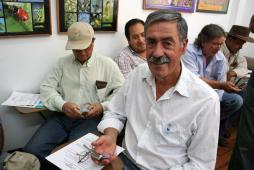At a small agrarian cooperative in Chile, farmers with little access to the internet have a new source of farming information: text messaging. The messages, a combination of national and international news and farming information about topics like weather and pricing, are part of a project called DatAgro, which aims to bring relevant farming information to rural populations that have little access to computers.
DatAgro is a collaboration between Washington, D.C.-based nonprofit DataDyne and the Santiago-based Zoltner Consulting Group, which looks at ways that ICTs can be used for development. The project is primarily funded by a $325,000 Knight News Challenge Grant and will continue until November 2010.
"The idea was to create a platform that allowed people who didn't have access to the internet to access news," said Meghan Cagley, a program officer at DataDyne. Although about 90 percent of people have cell phones in Chile, many of the people in the pilot study didn't know how to use text messaging, said John Zoltner, president of the Zoltner Consulting Group. "We ended up doing a lot more training than we ever thought we'd have to do," he said. They conducted three seminars to teach the farmers in the pilot how to open messages, delete messages and how to know when they'd received an SMS. "Everyone had cell phones, but they didn't necessarily know how to use it."
The pilot took place with the farmers of Coopeumo, an agrarian cooperative of about 400 small farmers in the town of Peumo. The first beta test involved 30 farmers, and an upcoming pilot will involve 300. It is too early to have any metrics or other data on the project's impact, said Zoltner, but anecdotally the farmers find the messages helpful. The team has worked hard to make sure the text messages' content is actually useful, said Claire Buré, project coordinator for the Zoltner Consulting Group. The farmers can choose from three main "channels" of information: agrarian innovation, information from the cooperative itself, and environment and sustainability.
Content on the channels has included messages about pricing, microcredit opportunities, available training sessions and weather updates, said Buré. Farmers can also receive news updates, including news on national or international events and sports. "No matter what we want to send to people, their favorite is getting football [soccer] scores," she said. Users can rank messages, and highly ranked messages go to a separate channel, Buré said. Not including the news updates, users receive two or three text messages each day. "One thing we learned is we can't space messages too closely together," said Buré. "If we send three right in a row it's a feeling of bombardment." Content sources include UNESCO, a Chilean government agency called the Foundation for Agrarian Innovation (FIA), and Chilean newspapers El Mostrador and El Mercurio.
The open-source system, built with Ruby on Rails, uses a web-based server connected to a cell phone by a USB cable. They've considered using an SMS gateway like Clickatell in the future, Zoltner said. The team receives some technology assistance from Entel PCS, the second largest mobile phone operator in Chile. In Chile, the sender pays for all text messages and phone calls, so there is no cost to the receiver. This means that the users receive all messages for free. Although the farmers now know how to use text messages, they are only getting the news alerts, and not texting each other. "They're not communicating with each other," said Zoltner. "We couldn't handle it because of cost, which is a real drawback of SMS."
In the future, DatAgro hopes to expand to other regions in Chile, and is already in discussions with another cooperative that is interested in the service. They also intend to further expand their content and partner with other organizations that bring ICTs to farming communities. "We want to create another channel based on RSS feeds," said Buré. They would use a keyword, like "price of maize," to provide users access to wider information. After the grant money runs out, the DatAgro team hopes the project will continue and be self-sustaining.
The software is open-source, and farmers in co-ops could pay for the program as part of their co-op fee. DatAgro has also considered some kind of advertising, either short ads on the same text message as the news content (much like these Please Call Me messages), or as separate text messages with advertising content. "We're not above some level of direct advertising if it's something that they've agreed to get," said Zoltner. The team also hopes to eventually move to other news sources as well. "I'd never say SMS messages are the sum totality of information that we should be providing to farmers," said Zoltner. "We're going to integrate with the information available on the web and increase access."


Post new comment